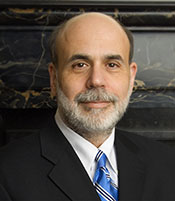$700-billion not enough, says Bernanke
14 January 2009
Federal Reserve Chairman Ben Bernanke said last night that President-elect Barack Obama's proposed fiscal stimulus package could help the economy, but he added that additional bailouts of financial institutions may also be needed to bring about a sustained economic recovery.
 Bernanke, speaking in London at the London School of Economics, said in his prepared remarks that the nearly $800 billion plan being discussed by the incoming Obama administration and the newly elected Congress "could provide a significant boost to economic activity." He did not comment on or endorse any specifics of the nearly $800 billion. (See: Obama seen favouring $775 billion stimulus plan: Reports)
Bernanke, speaking in London at the London School of Economics, said in his prepared remarks that the nearly $800 billion plan being discussed by the incoming Obama administration and the newly elected Congress "could provide a significant boost to economic activity." He did not comment on or endorse any specifics of the nearly $800 billion. (See: Obama seen favouring $775 billion stimulus plan: Reports)
But ''Fiscal actions are unlikely to promote a lasting recovery unless they are accompanied by strong measures to further stabilise and strengthen the financial system,'' he opined, adding, ''a modern economy cannot grow if its financial system is not operating effectively.''
Bernanke suggested that more banks and financial firms are likely to need additional capital injections from the government, and that further guarantees of their debt could be necessary, in return for the federal government receiving further equity in the firms.
The Fed chairman also said that "removing troubled assets from institutions' balance sheets, as was initially proposed for the US financial rescue plan," might also be needed to supplement any further investments in banks.
In addition to the actions taken by the Treasury to help banks, the Fed has made many moves to try and stimulate the economy. It has lowered interest rates to near zero, and has also pumped more than $1 trillion into the economy through various lending programs. This has created some concerns about the Fed's balance sheet, and whether or not it can continue to fund more rescue efforts without causing long-term damage to the economy, such as sparking inflation.
